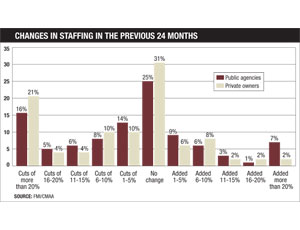As the construction recession drags on, industry firms look to those who hire them and write the checks to see when the downturn will end. While many owners believe the worst is past, most think there will be no quick turnaround in construction in the near future. When the market does turn around, owners worry about who will be there to take up the burden of rebuilding the nation’s industrial and public infrastructure.
As part of its overview, ENR once again is presenting its Top 425 Owners list. This list ranks publicly held companies based on the 2009 construction-in-progress figures they supplied to the U.S. Securities and Exchange Commission. The data was compiled by Capital IQ, a Standard & Poor’s business which, like ENR, is owned by The McGraw-Hill Cos.
Many publicly held firms do not separate their construction spending from other elements of their capital spending. To fill this gap, ENR is publishing its list of the Top 200 public companies ranked by their overall capital expenditures as reported to the SEC, also compiled by Capital IQ.
While the market continues to be sluggish, a recent study of capital expenditures by Bank of America Merrill Lynch (BAML) has found some markets to be surprisingly strong. The study, released on Oct. 15, revises strongly upward estimates made in January of capital spending in several sectors.
The study said BAML originally had estimated federal-sector capital expenditures (Capex) to be up 4.6% this year and down 1.9% in 2011 but now says capital spending will rise 7.6% this year and 7.4% next year. Similarly, BAML upped its Capex estimates for the metals and mining industries to +20.1% this year from -1.8% and to +1.1% next year from -13.5%. BAML estimates Capex investments in the industrial sector will rise 10.6% in 2011. Investments in the chemical sector will rise 6.6%, oil and gas will go up by 2.1%, and the utility sector will increase investments by 3.5%.
Concerning small owners, the research arm of Automatic Data Processing Inc. (ADP), a Roseland, N.J.-based business and payroll management firm, released a study of small businesses with fewer than 50 employees. It found that 52% of firms surveyed planned to expand their businesses in the next 12 months. However, less than 5% of the owners surveyed planned significant expansions for next year.
The most ambitious sectors in the survey were insurance, with 59% planning expansions, and financial services, with 55%. The least aggressive sectors were medical practices and construction companies, with only 42% planning any expansions in the near future.
Is the Worst Over?
The economy, like a massive ship, is beginning to turn around very slowly. On Oct. 29, the U.S. Dept. of Commerce announced that real gross domestic product rose at annual rate of 2.0% in the third quarter of 2010. While this marked the fifth-straight quarter that GDP has grown, the rate was below expectations.
However, this uptick has not translated into a surge of work. “My feeling from talking to our members is that the worst may be over and conditions [for construction] are improving, but there still is some uncertainty,” says Wayne Crew, director of the Construction Industry Institute, an industry research organization based at the University of Texas, Austin. “We will know more early in 2011.”
Crew says the industry recession has caused owners to look more carefully at new project delivery systems and how projects can be executed more efficiently. He also notes that some approaches, like integrated project delivery, call for a sharing of risks and rewards on projects, a reversal of recent trends. “For many years, there was a trend among owners to shift risk allocation to the contractor,” he says. “We are now seeing changes in project delivery systems that are beginning to shift a portion of the risk back toward the owner.”
Many owners worry about how their service providers have been bearing up to the economic pressures of a hypercompetitive market. But the largest and most sophisticated owners have not been overly concerned, say some. “I haven’t seen many contractors buying work at below-market prices,” says David McKinney, vice president of nuclear construction for The Southern Co., Atlanta. “The big owners like us tend to deal with the better-run contractors that don’t play that game.”
For many in the industry, globalization is having an impact not just on markets but on procurement. “Large owners are seeing more international construction firms entering the U.S. market,” says Crew, noting several recent industry acquisitions by foreign contractors. He also says competition from China may begin to appear. “China is no longer an emerging nation. It has emerged.”
McKinney says globalization is affecting project design and execution. He says owners increasingly are being exposed to design and construction innovations on international jobs that are not generally used in the U.S. “No one wants to be serial No. 1 on any new process,...















Post a comment to this article
Report Abusive Comment